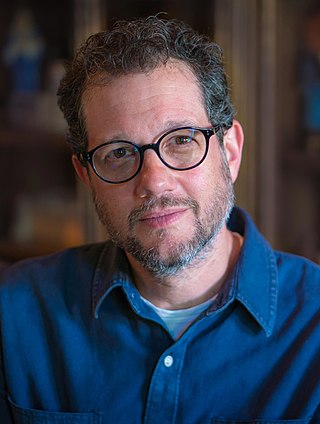
Dennis Christopher George Potter was an English television dramatist, screenwriter and journalist. He is best known for his BBC television serials Pennies from Heaven (1978), The Singing Detective (1986), and the BBC television plays Blue Remembered Hills (1979) and Brimstone and Treacle (1976). His television dramas mixed fantasy and reality, the personal and the social, and often used themes and images from popular culture. Potter is widely regarded as one of the most influential and innovative dramatists to have worked in British television.

Andrew Wynford Davies is a Welsh screenwriter and novelist, best known for his television adaptations of To Serve Them All My Days, House of Cards, Middlemarch, Pride and Prejudice, Bleak House, War & Peace, and his original serial A Very Peculiar Practice. He was made a BAFTA Fellow in 2002.
A television pilot, in United Kingdom and United States television, is a standalone episode of a television series that is used to sell a show to a television network or other distributor. A pilot is created to be a testing ground to gauge whether a series will be successful. It is, therefore, a test episode for the intended television series, an early step in the series development, much like pilot studies serve as precursors to the start of larger activity.

James Lawrence Brooks is an American director, producer, screenwriter and co-founder of Gracie Films. His television and film work includes The Mary Tyler Moore Show, Taxi, The Simpsons, Broadcast News, As Good as It Gets, and Terms of Endearment.
Three, stylized as +HR=E, is a New Zealand nationwide television channel. Launched on 26 November 1989 as TV3, it was New Zealand's first privately owned television channel. The channel currently broadcasts nationally in digital free-to-air form via the state-owned Kordia on terrestrial and satellite. Vodafone also carries the channel for their cable subscribers in Wellington and Christchurch. It previously broadcast nationally on analogue television until that was switched off on 1 December 2013.

France Télévisions is the French national public television broadcaster. It is a state-owned company formed from the integration of the public television channels France 2 and France 3, later joined by the legally independent channels France 4, France 5 and France Info.

Michael Giacchino is an American composer of music for film, television, and video games. He has received many awards, including an Oscar for his work on Up (2009), an Emmy for his work on Lost (2004), and three Grammys for his work on Ratatouille (2007) and Up (2009). Beginning in 2018, he ventured into directing as well, and as a director is best known for Marvel Studios' Werewolf by Night.

William Henry Duke Jr. is an American actor and film director. Known for his physically imposing frame, Duke works primarily in the action and crime drama genres often as a character related to law enforcement. Frequently a character actor, he has starred opposite Arnold Schwarzenegger in Commando and Predator, and has appeared in films like American Gigolo, No Man's Land, Bird on a Wire, Menace II Society, Exit Wounds, Payback, X-Men: The Last Stand, and Mandy. In television, he is best known as Agent Percy Odell in Black Lightning.

DHX Cookie Jar Inc. was a Canadian media production and distribution company owned by DHX Media. The company was first established in 1976 as CINAR Films Inc., a Montreal-based studio that was heavily involved in children's entertainment. The company's business model, which included the licensing of its properties into educational markets, had a significant impact on its success; by 1999, CINAR held CDN$1.5 billion of the overall children's television market.
Music licensing is the licensed use of copyrighted music. Music licensing is intended to ensure that the owners of copyrights on musical works are compensated for certain uses of their work. A purchaser has limited rights to use the work without a separate agreement.
Scratch video was a British video art movement that emerged in the early to mid-1980s. It was characterised by the use of found footage, fast cutting, and multi-layered rhythms. As a form of outsider art, it challenged many of the establishment assumptions of broadcast television, as well of those of gallery-bound video art.

The Bell System Science Series consists of nine television specials made for the AT&T Corporation that were originally broadcast in color between 1956 and 1964. Marcel LaFollette has described them as "specials that combined clever story lines, sophisticated animation, veteran character actors, films of natural phenomena, interviews with scientists, and precise explanation of scientific and technical concepts—all in the pursuit of better public understanding of science." Geoff Alexander and Rick Prelinger have described the films as "among the best known and remembered educational films ever made, and enthroning Dr. Frank Baxter, professor at the University of Southern California, as something of a legend as the omniscient king of academic science films hosts."

A television show – or TV Program - or simply a TV show – is the general reference to any content produced for viewing on a television set that is broadcast via over-the-air, satellite, or cable. This includes content made by television broadcasters and content made for broadcasting by film production companies. It excludes breaking news, advertisements, or trailers that are typically placed between shows. Television shows are most often scheduled for broadcast well ahead of time and appear on electronic guides or other TV listings, but streaming services often make them available for viewing anytime. The content in a television show is produced by one of two production methodologies: live taped shows such as variety and news magazine shows shot on a television studio stage or sporting events The other production model includes animation and a variety of film productions ranging from movies to series. Shows not produced on a television studio stage are usually contracted or licensed to be made by appropriate production companies.

Ksenia Solo is a Latvian-Canadian actress known for portraying Mackenzie "Kenzi" Malikov on Lost Girl. She portrayed Peggy Shippen on Turn: Washington's Spies. Solo also portrayed the character "Natasha" in the 2010 American television series Life Unexpected and Shay Davydov in Season 3 of Orphan Black. As of January 2023, her most recent work was in the main cast for the two seasons of the series Project Blue Book (2019–20).

Lost television broadcasts are mostly those early television programs which cannot be accounted for in studio archives usually because of deliberate destruction or neglect.
Perry Mason is a fictional criminal defense attorney, in works of detective fiction written by Erle Stanley Gardner.

Lost media is an umbrella term describing examples of media that are nonexistent, missing, or unavailable to the general public. The term primarily encompasses visual, audio, or audiovisual media such as films, television and radio broadcasts, music, and video games.











